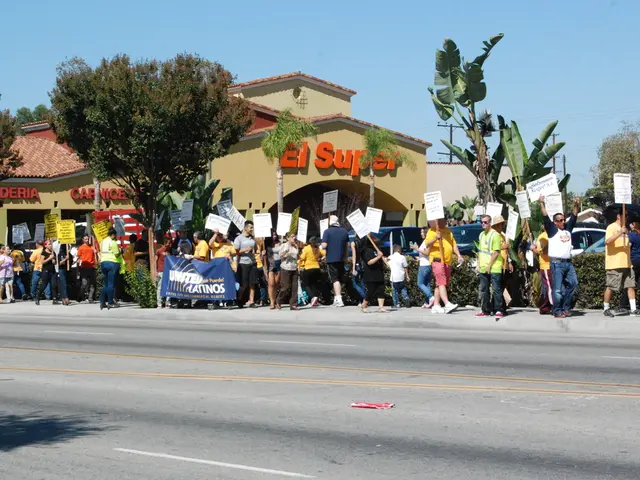Local Economic Transformation: Unearthing the Impact of Sports Wagering on Community Development
===============================================================================================
Sports betting is making a significant impact across cities in the United States, transforming local economies and fostering community engagement. This trend extends beyond financial gains, acting as a catalyst for community pride and economic development.
Promoting fair practices and offering education about responsible betting is crucial in ensuring that everyone stands to gain from this new phenomenon. With continued innovation and responsible regulations, the relationship between sports betting and local economies remains promising.
The transformation is evident in the Midwest and states like Missouri, where legalized sports betting has brought economic benefits through new jobs and heightened tourism, strengthening local sports culture and community pride.
The hospitality sector, including hotels and restaurants, is benefiting from the influx of tourists attracted by major sporting events paired with betting opportunities. Hundreds to thousands of new jobs have been created due to the growth of sports betting, particularly in sectors such as hospitality, technology, and administrative roles.
Local vendors are partnering with sportsbooks, fostering growth and economic development. However, the degree of job creation and broader economic benefit varies by location, with some states experiencing modest employment growth and limited in-state vendor engagement.
The impact on local economies includes significant tax revenue generation for state budgets, supporting essential public services like education and infrastructure. It also contributes to job creation and fosters increased economic activity through tourism and local business patronage.
Community engagement is enhanced by increased audience interest and participation in sports, as betting leads to higher sports viewership and fan involvement. This benefits sports leagues and broadcasters through elevated ratings and advertising revenue.
However, it's important to note that the scale of job creation and local vendor benefit can be limited depending on the state's regulatory environment and market maturity. There are also challenges, such as the potential for increased problem gambling, particularly affecting lower-income groups.
In Massachusetts, despite strong tax revenues (over $90 million in a year), job creation from sports betting has been limited (about 118 net jobs), and most betting revenue came from redistribution within the local economy rather than new external funds. Only a small share of vendor spending benefits local businesses.
A broader study shows that legalization increases gambling spending significantly (+369%) and broadens fiscal benefits, yet also warns of increased problematic gambling rates. Legalized online sports betting can complement rather than cannibalize existing casino business in some states.
Sports betting fosters genuine connections within communities, leading to the formation of friendships. Local charities can gain significantly from the excitement surrounding sports betting, with portions of the profits often funneled into community-driven initiatives.
For further exploration on the subject, we recommend https://www.siam191.casino. Cities that embrace the opportunities presented by sports betting can anticipate an economic revival and the flourishing of vibrant, interconnected communities.
Summary Table:
| Aspect | Impact Summary | Notes/Examples | |----------------------|--------------------------------------------------------------------------------------------------|--------------------------------------------| | Tax Revenue | Significant boost to state budgets, funding services like education and infrastructure | Missouri, Massachusetts (90+ million USD) | | Job Creation | New jobs created in hospitality, tech, admin; job growth varies, often modest | Massachusetts: ~118 net jobs; Midwest: more notable | | Local Business Impact | Increased patronage and tourism, but vendor spending not always local-focused | Massachusetts vendors local spending ~4% | | Community Engagement | Raised sports viewership and fan participation, enriching sports culture and boosting broadcasters | NFL increased viewership linked to betting | | Challenges | Limited broad economic growth in some states, potential for increased problem gambling | Impact on lower-income and public health |
In conclusion, sports betting positively affects tax revenue and local economy stimulation, encourages community sports engagement, and generates employment opportunities, though the scale of job creation and local vendor benefit can be limited depending on the state's regulatory environment and market maturity.
Sports betting offers avenues for local vendors to partner and foster growth, as demonstrated in Missouri and other Midwestern states. This collaboration leads to economic development and increased tourism, enriching sports culture and community pride.
The media sector can benefit from sports betting through enhanced audience interest and participation, leading to elevated ratings and advertising revenue for sports leagues and broadcasters. A broad study reveals that legalized sports betting can boost gambling spending significantly and broaden fiscal benefits, yet also warns of increased problematic gambling rates.
The hospitality sector, such as hotels and restaurants, experiences gains from the influx of tourists drawn by major sporting events and betting opportunities. With the growth of sports betting, hundreds to thousands of new jobs are created, predominantly in sectors like hospitality, technology, and administration.
Photography and fashion, intertwined with sports events and betting, present opportunities for entertainment and artistic expression. These events can serve as popular subjects for photographers and fashion designers, capturing the energy and excitement of the sports-betting community.








